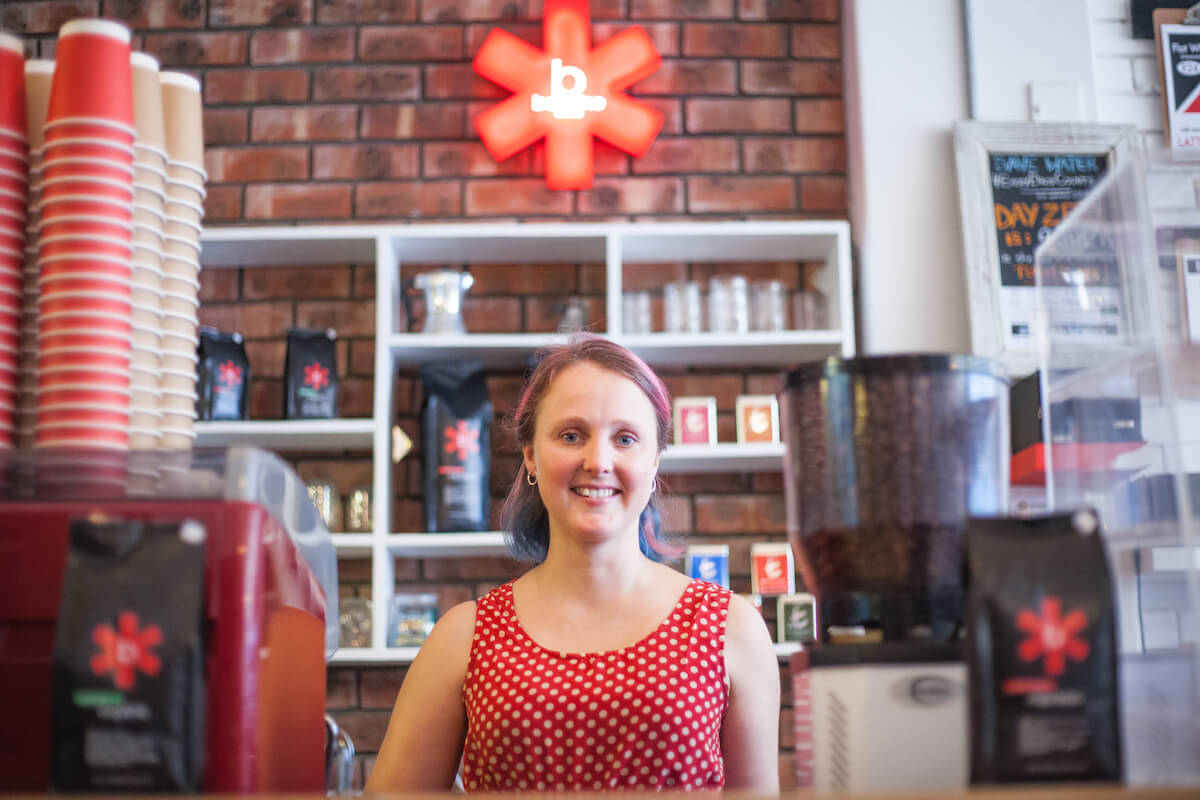In times of crisis, you find out what people are really made of. As South Africa’s water reserves dwindle, we’ve all had to cut down on water usage. Though things are looking better than they were a couple of months ago, we haven’t won yet. A major part of the success so far is down to local businesses taking water wisdom seriously. Take Baseline Coffee.
They are a primarily a supplier, servicing established hotspots such as Liquorice & Lime, IYO Burgers and Den Anker with excellent arabica beans. Their roastery also serves as a cafe, with professionals based in the surrounding area coming in regularly for a premium pick-me-up.
The charming roastery and cafe is nestled in a vibrant block in Woodstock. It’s run by Deon and Stacy, who started the company with the belief that ‘Bad Coffee Shouldn’t Happen To Good People’.
If we can help inspire anyone else, that makes us happy.
The culture of social responsibility and corporate conscience is deep in the DNA of the business. Baseline Coffee started as Kupa Coffee, which is Swahili for “to give”. Donations to Common Good, fundraisers and quarterly blood drives have defined the company in both its iterations.
“We’re not here doing open heart surgery and saving lives,” Stacy says, positive and determined. “If we can’t find a way to give back, what are we doing here? We have to help somehow.”
Saving water is a big part of that. Not only is Stacy determined that her business doesn’t contribute to the problem; she makes sure that Baseline Coffee takes active steps to help others reduce their own water footprints. Here’s what they have implemented.
Education
“We’ve had customers come in and not know what Day Zero is. You want to bop them over the head with a rock!” she jokes, with a hint of seriousness. “We’ve got a chalkboard behind the counter with the latest date, so at least they know now. It starts a conversation one way or another. When more than one person came in that was a bit oblivious, we realised that quietly going about saving water ourselves wasn’t enough.”
Cutting down on waste
Part of the drive to save water saw Baseline Coffee cut out sit-down coffee cups; an initiative that they started in April 2017. “We were maybe a bit ahead of the curve there and a few customers complained. But even though costs went up, we were saving over 60L per day! Totally worth it.” says Stacy, with a smile.
It’s well known that take-away coffee cups come with their own problems and Baseline Coffee is on top of it. “We’re conscious of excess waste creation and don’t want to save water and contribute to climate change as a result. Our straws are compostable and our cups are recycled and recyclable. And our bottled water is in glass.”
Reducing the amount of water coming out of the taps
Other changes Baseline Coffee have made include getting the process going to fit aerators on their taps and encouraging the landlord to install them throughout the building. And special filters that have converted the espresso machine so that it is able to run off of a separate (non-municipal) water system.
They have also encouraged all of their wholesalers to install the same thing to reduce load on the municipal system. One of their customers, Den Anker, has already converted their entire coffee setup to run off of this off-the- grid“water canister” system.
Making use of a water tank
Deon and Stacy have purchased a 1000L tank which lived in the middle of their roastery. They will fill it with water from an off-the-grid certified stream should the need arise. It will be used to provide drinking water for their business, their customers and other businesses in the area.
Tracking their efforts
“A major obstacle to overcome was the fact that the entire building had one water meter. When it got to the point that we knew our consumption was far lower but the block’s average hardly changed, it became clear that other businesses weren’t taking the water shortage seriously enough.”
Baseline Coffee had been monitoring their average water usage by analysing the number of cups of coffee they made and calculating the amount of water used by using a formula. This turned out to be different from the amount of water they were billed for, as billing was an average of a percentage of the building’s usage.
When the water meter was installed, they could confirm their calculations. It also encouraged them to stop serving tap water and now, they constantly monitor and tweak their usage thanks to the meter.
By making the water shortage a talking point at Baseline Coffee and ensuring that they are doing what they can to save water as a business, as well as trying to educate and motivate others to do the same, Stacy and Deon are making a genuine difference.
Find our more about Baseline Coffee on their website and Facebook page.



